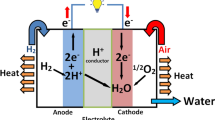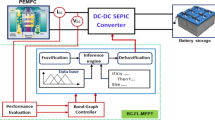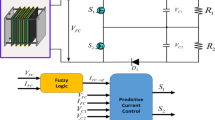Abstract
Recently, wide installations of photovoltaic (PV) systems have been achieved in the electrical power systems. However, fluctuated output power of the PV generation and/or fluctuated load demands represent critical factors for the operation of PV systems. Thence, energy storage systems (ESSs) are highly needed for improving the supply reliability of PV generation systems. Among existing ESSs, the proton exchange membrane fuel cell (PEMFC) systems represent long-lifetime, efficient, and cost-effective solutions for PV systems. However, nonlinear behaviour exists in the output of PEMFC systems, which depends on the operating cell temperature, and the membrane water contents. The output of PEMFC has a unique operating maximum power point (MPP) for each operating combination of membrane water content and temperature, which requires MPP tracking (MPPT) control loop. Therefore, this paper presents a fuzzy logic control (FLC) MPPT method for enhancing the operation of PEMFC systems. The traditional MPPT methods in the literature employ three sensors, including voltage, water content, and temperature. The proposed controller employs only the PEMFC output current and voltage electrical signals. Compared to the classical fixed step size perturb and observe (P and O) and hill climbing MPPT methods, the proposed method represents variable step size MPPT method. In addition, compared to the widely employed incremental conductance (INC) and incremental resistance (INR) MPPT methods, the proposed method benefits the wide operating and adaptive step size MPPT operation due to using the FLC approach. The proposed method is simple and can be implemented using low cost microcontrollers. The design procedures, operating principle, and performance verification of the proposed method are presented in this paper.









Similar content being viewed by others
Explore related subjects
Discover the latest articles and news from researchers in related subjects, suggested using machine learning.References
Ali A, Raisz D, Mahmoud K (2019) Optimal oversizing of utility-owned renewable DG inverter for voltage rise prevention in MV distribution systems. Int J Electr Power Energy Syst 105:500–513. https://doi.org/10.1016/j.ijepes.2018.08.040
Mahmoud K, Abdel-Nasser M (2019) Fast yet accurate energy-loss-assessment approach for analyzing/sizing PV in distribution systems using machine learning. IEEE Trans Sustain Energy 10(3):1025–1033. https://doi.org/10.1109/TSTE.2018.2859036
Aly M, Ramadan HA (2019) Design and implementation of adaptive SVPWM algorithm for multilevel inverters in renewable energy applications. Sol Energy 183:745–754. https://doi.org/10.1016/j.solener.2019.03.069
Aly M, Ahmed EM, Shoyama M (2017) Thermal and reliability assessment for wind energy systems with DSTATCOM functionality in resilient microgrids. IEEE Trans Sustain Energy 8(3):953–965. https://doi.org/10.1109/TSTE.2016.2635200
Said SM, Aly M, Hartmann B, Alharbi AG, Ahmed EM (2019) SMES-based fuzzy logic approach for enhancing the reliability of microgrids equipped with PV generators. IEEE Access 7:92059–92069. https://doi.org/10.1109/ACCESS.2019.2927902
Alhaider MM, Ahmed EM, Aly M, Serhan HA, Mohamed EA, Ali ZM (2020) New temperature-compensated multi-step constant-current charging method for reliable operation of battery energy storage systems. IEEE Access 8:27961–27972. https://doi.org/10.1109/ACCESS.2020.2972391
Habib M, Ladjici AA, Harrag A (2020) Microgrid management using hybrid inverter fuzzy-based control. Neural Comput Appl 32(13):9093–9111. https://doi.org/10.1007/s00521-019-04420-5
Puranik I, Zhang L, Qin J (2018) Impact of low-frequency ripple on lifetime of battery in MMC-based battery storage systems. In: 2018 IEEE energy conversion congress and exposition (ECCE), Portland, OR, pp 2748–2752. https://doi.org/10.1109/ECCE.2018.8558061
Eid A (2014) Utility integration of PV-wind-fuel cell hybrid distributed generation systems under variable load demands. Int J Electr Power Energy Syst 62:689–699. https://doi.org/10.1016/j.ijepes.2014.05.020
Tang Y, Bu C, Liu M, Zhang L, Lian Q (2018) Application of ELM–Hammerstein model to the identification of solid oxide fuel cells. Neural Comput Appl 29(2):401–411. https://doi.org/10.1007/s00521-016-2453-y
El-Hay EA, El-Hameed MA, El-Fergany AA (2019) Improved performance of PEM fuel cells stack feeding switched reluctance motor using multi-objective dragonfly optimizer. Neural Comput Appl 31(11):6909–6924. https://doi.org/10.1007/s00521-018-3524-z
Wang Y, Wang Y, Chen G (2020) Robust composite adaptive neural network control for air management system of PEM fuel cell based on high-gain observer. Neural Comput Appl 32(14):10229–10243. https://doi.org/10.1007/s00521-019-04561-7
Lü X, Qu Y, Wang Y, Qin C, Liu G (2018) A comprehensive review on hybrid power system for PEMFC-HEV: issues and strategies. Energy Convers Manag 171:1273–1291. https://doi.org/10.1016/j.enconman.2018.06.065
Liu G et al (2020) Thermodynamic modeling and analysis of a novel PEMFC-ORC combined power system. Energy Convers Manag 217:112998. https://doi.org/10.1016/j.enconman.2020.112998
Chitsaz A, Haghghi MA, Hosseinpour J (2019) Thermodynamic and exergoeconomic analyses of a proton exchange membrane fuel cell (PEMFC) system and the feasibility evaluation of integrating with a proton exchange membrane electrolyzer (PEME). Energy Convers Manag 186:487–499. https://doi.org/10.1016/j.enconman.2019.03.004
Chen X et al (2021) Thermodynamic and economic study of PEMFC stack considering degradation characteristic. Energy Convers Manag 235:114016. https://doi.org/10.1016/j.enconman.2021.114016
Yin L, Li Q, Chen W, Wang T, Liu H (2019) Experimental analysis of optimal performance for a 5 kW PEMFC system. Int J Hydrog Energy 44(11):5499–5506. https://doi.org/10.1016/j.ijhydene.2018.08.157
Lee JY, Lee JH, Kim TS (2019) Thermo-economic analysis of using an organic Rankine cycle for heat recovery from both the cell stack and reformer in a PEMFC for power generation. Int J Hydrog Energy 44(7):3876–3890. https://doi.org/10.1016/j.ijhydene.2018.12.071
Yan H et al (2020) Techno-economic evaluation and technology roadmap of the MWe-scale SOFC-PEMFC hybrid fuel cell system for clean power generation. J Clean Prod 255:120225. https://doi.org/10.1016/j.jclepro.2020.120225
Authayanun S, Hacker V (2018) Energy and exergy analyses of a stand-alone HT-PEMFC based trigeneration system for residential applications. Energy Convers Manag 160:230–242. https://doi.org/10.1016/j.enconman.2018.01.022
Yang F, Huang N, Sun Q, Cheng L, Wennersten R (2018) Modeling and techno-economic analysis of the heat pump-integrated PEMFC-based micro-CHP system. Energy Procedia 152:83–88. https://doi.org/10.1016/j.egypro.2018.09.063
Bayrak ZU, Kaya U, Oksuztepe E (2020) Investigation of PEMFC performance for cruising hybrid powered fixed-wing electric UAV in different temperatures. Int J Hydrog Energy 45(11):7036–7045. https://doi.org/10.1016/j.ijhydene.2019.12.214
González-Espasandín Ó, Leo TJ, Raso MA, Navarro E (2019) Direct methanol fuel cell (DMFC) and H2 proton exchange membrane fuel (PEMFC/H2) cell performance under atmospheric flight conditions of Unmanned Aerial Vehicles. Renew Energy 130:762–773. https://doi.org/10.1016/j.renene.2018.06.105
Jin J, Hu M, Zhao X (2020) Investigation of incorporating oxygen into TiN coating to resist high potential effects on PEMFC bipolar plates in vehicle applications. Int J Hydrog Energy 45(43):23310–23326. https://doi.org/10.1016/j.ijhydene.2020.06.059
Wu Z et al (2019) Dynamic modeling and operation strategy of an NG-fueled SOFC-WGS-TSA-PEMFC hybrid energy conversion system for fuel cell vehicle by using MATLAB/SIMULINK. Energy 175:567–579. https://doi.org/10.1016/j.energy.2019.03.119
Arévalo P, Cano A, Jurado F (2020) Comparative study of two new energy control systems based on PEMFC for a hybrid tramway in Ecuador. Int J Hydrog Energy 45(46):25357–25377. https://doi.org/10.1016/j.ijhydene.2020.06.212
Peng F et al (2017) Development of master-slave energy management strategy based on fuzzy logic hysteresis state machine and differential power processing compensation for a PEMFC-LIB-SC hybrid tramway. Appl Energy 206:346–363. https://doi.org/10.1016/j.apenergy.2017.08.128
Aly M, Rezk H (2020) A differential evolution-based optimized fuzzy logic MPPT method for enhancing the maximum power extraction of proton exchange membrane fuel cells. IEEE Access 8:172219–172232. https://doi.org/10.1109/ACCESS.2020.3025222
Benyahia N et al (2014) MPPT controller for an interleaved boost dc–dc converter used in fuel cell electric vehicles. Int J Hydrog Energy 39(27):15196–15205. https://doi.org/10.1016/j.ijhydene.2014.03.185
Harrag A, Messalti S (2017) Variable step size IC MPPT controller for PEMFC power system improving static and dynamic performances. Fuel Cells 17(6):816–824. https://doi.org/10.1002/fuce.201700047
Rezk H, Fathy A (2020) Performance improvement of PEM fuel cell using variable step-size incremental resistance MPPT technique. Sustainability 12(14):5601. https://doi.org/10.3390/su12145601
Rana KPS, Kumar V, Sehgal N, George S (2019) A Novel dP/dI feedback based control scheme using GWO tuned PID controller for efficient MPPT of PEM fuel cell. ISA Trans 93:312–324. https://doi.org/10.1016/j.isatra.2019.02.038
Kler D, Rana KPS, Kumar V (2018) A nonlinear PID controller based novel maximum power point tracker for PV systems. J Frankl Inst 355(16):7827–7864. https://doi.org/10.1016/j.jfranklin.2018.06.003
Bahri H, Harrag A (2021) Ingenious golden section search MPPT algorithm for PEM fuel cell power system. Neural Comput Appl. https://doi.org/10.1007/s00521-020-05581-4
Cao Y, Li Y, Zhang G, Jermsittiparsert K, Nasseri M (2020) An efficient terminal voltage control for PEMFC based on an improved version of whale optimization algorithm. Energy Rep 6:530–542. https://doi.org/10.1016/j.egyr.2020.02.035
Nanadegani FS, Lay EN, Iranzo A, Salva JA, Sunden B (2020) On neural network modeling to maximize the power output of PEMFCs. Electrochim Acta 348:136345. https://doi.org/10.1016/j.electacta.2020.136345
Reddy KJ, Sudhakar N (2019) ANFIS-MPPT control algorithm for a PEMFC system used in electric vehicle applications. Int J Hydrog Energy 44(29):15355–15369. https://doi.org/10.1016/j.ijhydene.2019.04.054
Jyotheeswara Reddy K, Sudhakar N (2018) A new RBFN based MPPT controller for grid-connected PEMFC system with high step-up three-phase IBC. Int J Hydrog Energy 43(37):17835–17848. https://doi.org/10.1016/j.ijhydene.2018.07.177
Ahmadi S, Abdi Sh, Kakavand M (2017) Maximum power point tracking of a proton exchange membrane fuel cell system using PSO-PID controller. Int J Hydrog Energy 42(32):20430–20443. https://doi.org/10.1016/j.ijhydene.2017.06.208
Harrag A, Bahri H (2017) Novel neural network IC-based variable step size fuel cell MPPT controller. Int J Hydrog Energy 42(5):3549–3563. https://doi.org/10.1016/j.ijhydene.2016.12.079
Jyotheeswara Reddy K, Sudhakar N (2018) High voltage gain interleaved boost converter with neural network based MPPT controller for fuel cell based electric vehicle applications. IEEE Access 6:3899–3908. https://doi.org/10.1109/ACCESS.2017.2785832
Rezk H, Aly M, Al-Dhaifallah M, Shoyama M (2019) Design and hardware implementation of new adaptive fuzzy logic-based MPPT control method for photovoltaic applications. IEEE Access 7:106427–106438. https://doi.org/10.1109/ACCESS.2019.2932694
Al Nabulsi A, Dhaouadi R (2012) Efficiency optimization of a DSP-based standalone PV system using fuzzy logic and dual-MPPT control. IEEE Trans Ind Inform 8(3):573–584. https://doi.org/10.1109/TII.2012.2192282
Mule S, Hardas R, Kulkarni NR (2016) P&O, IncCon and fuzzy logic implemented MPPT scheme for PV systems using PIC18F452. In: 2016 International conference on wireless communications, signal processing and networking (WiSPNET), Chennai, India, pp 1320–1325. https://doi.org/10.1109/WiSPNET.2016.7566351
Aly M, Rezk H (2021) A MPPT based on optimized FLC using manta ray foraging optimization algorithm for thermo-electric generation systems. Int J Energy Res. https://doi.org/10.1002/er.6728
Khan MJ, Mathew L (2019) Fuzzy logic controller-based MPPT for hybrid photo-voltaic/wind/fuel cell power system. Neural Comput Appl 31(10):6331–6344. https://doi.org/10.1007/s00521-018-3456-7
Said SM, Aly M, Balint H (2020) An efficient reactive power dispatch method for hybrid photovoltaic and superconducting magnetic energy storage inverters in utility grids. IEEE Access 8:183708–183721. https://doi.org/10.1109/access.2020.3029326
Salama HS, Said SM, Aly M, Vokony I, Hartmann B (2021) Studying impacts of electric vehicle functionalities in wind energy-powered utility grids with energy storage device. IEEE Access 9:45754–45769. https://doi.org/10.1109/ACCESS.2021.3066877
Aly M, Ahmed EM, Rezk H, Mohamed EA (2021) Marine predators algorithm optimized reduced sensor fuzzy-logic based maximum power point tracking of fuel cell-battery standalone applications. IEEE Access 9:27987–28000. https://doi.org/10.1109/ACCESS.2021.3058610
Harrag A, Rezk H (2021) Indirect P&O type-2 fuzzy-based adaptive step MPPT for proton exchange membrane fuel cell. Neural Comput Appl. https://doi.org/10.1007/s00521-021-05729-w
Menesy AS, Sultan HM, Korashy A, Kamel S, Jurado F (2021) A modified farmland fertility optimizer for parameters estimation of fuel cell models. Neural Comput Appl. https://doi.org/10.1007/s00521-021-05821-1
Mossa MA, Kamel OM, Sultan HM, Diab AAZ (2020) Parameter estimation of PEMFC model based on Harris Hawks’ optimization and atom search optimization algorithms. Neural Comput Appl. https://doi.org/10.1007/s00521-020-05333-4
Kumar YS, Gupta R (2012) Maximum power point tracking of multiple photovoltaic arrays. In: 2012 Students conference on engineering and systems, Allahabad, Uttar Pradesh, India, pp 1–6. https://doi.org/10.1109/SCES.2012.6199027
Hauke B (2015) Basic calculation of a boost converter’s power stage. Tex Instrum. https://doi.org/10.4000/nuevomundo.30565
Al-Majidi SD, Abbod MF, Al-Raweshidy HS (2018) A novel maximum power point tracking technique based on fuzzy logic for photovoltaic systems. Int J Hydrog Energy 43(31):14158–14171. https://doi.org/10.1016/j.ijhydene.2018.06.002
Chen C-H, Jeng S-Y, Lin C-J (2020) Mobile robot wall-following control using fuzzy logic controller with improved differential search and reinforcement learning. Mathematics 8(8):1254. https://doi.org/10.3390/math8081254
Carnero MC (2020) Fuzzy multicriteria models for decision making in gamification. Mathematics 8(5):682. https://doi.org/10.3390/math8050682
Funding
This work was supported by the Chilean Government through Projects SERC Chile (ANID/FONDAP15110019), and AC3E (ANID/Basal/FB0008).
Author information
Authors and Affiliations
Contributions
All authors collaborated and contributed equally to this work. All authors have read and agreed to the published version of the manuscript.
Corresponding author
Ethics declarations
Conflict of interest
The authors declare no conflict of interest.
Additional information
Publisher's Note
Springer Nature remains neutral with regard to jurisdictional claims in published maps and institutional affiliations.
Rights and permissions
About this article
Cite this article
Aly, M., Rezk, H. An improved fuzzy logic control-based MPPT method to enhance the performance of PEM fuel cell system. Neural Comput & Applic 34, 4555–4566 (2022). https://doi.org/10.1007/s00521-021-06611-5
Received:
Accepted:
Published:
Issue Date:
DOI: https://doi.org/10.1007/s00521-021-06611-5




